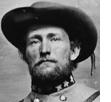 This week I have been busy researching and writing a piece on John Singleton Mosby for a client. To be completely honest, I was not all that familiar with the man, although I have spent some time with Mosby historians at the Gray Ghost Winery and I am familiar with his famous raid in March of 1863 when he captured three high-ranking Union officers at Fairfax Courthouse, including Brigadier General Edwin H. Stoughton.
This week I have been busy researching and writing a piece on John Singleton Mosby for a client. To be completely honest, I was not all that familiar with the man, although I have spent some time with Mosby historians at the Gray Ghost Winery and I am familiar with his famous raid in March of 1863 when he captured three high-ranking Union officers at Fairfax Courthouse, including Brigadier General Edwin H. Stoughton.
From what I gather, Mosby is one of those “larger than life figures” whose military contributions are still debated by experts to this very day. I asked my friend Eric Wittenberg of his thoughts on the legacy of “The Grey Ghost.” He stated that Mosby’s contributions were, in his opinion, more of a psychological deterrent and nuisance, and less of a tactical benefit in the grand scheme of things.
In January of 1863, Major General J.E.B. Stuart tasked one of his most gifted scouts, First Lieutenant John Singleton Mosby, with forming and leading a new group of southern horsemen known as the 43rd Battalion Virginia Cavalry. Acting under the permission of General Robert E. Lee, and in accordance with the Confederate Congress’ Partisan Ranger Act of 1862, this group was christened “Mosby’s Rangers.”
Throughout the course of the Civil War, “The Grey Ghost” and his men continued to make life miserable for Union suppliers and couriers. Despite never taking part in any major engagements, their reputation continued to spread across the Old Dominion. Following the South’s surrender at Appomattox Courthouse in 1865, Mosby begrudgingly disbanded his troops, vowing to never surrender formally.
Ironically “The Grey Ghost” went on to become a Republican campaign manager in Virginia for future President Ulysses S. Grant. With regard to his background with the Confederacy, Mosby wrote, “I am not ashamed of having fought on the side of slavery — a soldier fights for his country — right or wrong — he is not responsible for the political merits of the course he fights in...The South was my country.”
This is perhaps the most interesting aspect of Mosby’s life as his postwar politics did not sit well with many of his peers. I liken this to James Longstreet’s participation in the Republican Party and the backlash that he experienced. As a result, I am now interested in Confederate officers who chose to enter the political sector following the war and especially those who gravitated toward Lincoln’s party. I hope to explore this topic in more detail as time permits and invite your thoughts on the subject.





